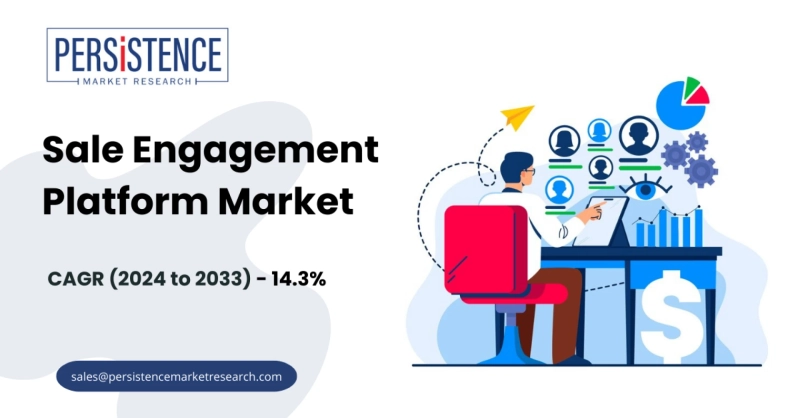About the Market
The global sales engagement platform market has surged, reaching US$ 8.99 billion in 2024 and projected to grow to US$ 29.62 billion by 2033, driven by a robust CAGR of 14.3% over the forecast period. These platforms serve as centralized hubs for automating sales activities like prospecting, lead nurturing, and sales analytics, integrating seamlessly with CRM systems and email clients to enhance sales team efficiency. North America led the market with a 26.9% share in 2022, followed by Europe at 19.5%. India\'s market is set to grow at a 17.2% CAGR, fueled by the rise of remote work and dispersed sales teams, while the BFSI sector anticipates a 17% CAGR, reflecting strong sector-specific demand.
However, challenges loom, particularly around data privacy and security. Compliance with regulations like GDPR is crucial as these platforms handle sensitive customer data. Robust security measures, including encryption and regular audits, are essential to mitigate risks of breaches and uphold customer trust. Industry developments, such as Apollo.io\'s integration of buying intent data and ZoomInfo\'s acquisition of Chorus.ai for enhanced sales intelligence, underscore ongoing innovation in the market. As businesses increasingly adopt data-driven strategies and digital transformation, the demand for effective sales engagement solutions is expected to accelerate, fostering continued market expansion and innovation in the coming years.
Best Sales Engagement Platform
In the realm of modern sales strategies, choosing the best Sales Engagement Platform (SEP) can significantly impact sales efficiency, customer engagement, and overall business success. This article explores what makes a SEP stand out as the best choice for businesses, highlighting key features, benefits, and considerations.
Understanding Sales Engagement Platforms
Defining Sales Engagement Platforms
Sales Engagement Platforms (SEPs) are comprehensive software solutions designed to optimize and streamline sales processes through integration with Customer Relationship Management (CRM) systems, advanced analytics, automation, and AI-driven insights. These platforms empower sales teams to enhance productivity, improve sales effectiveness, and deliver personalized customer experiences.
Key Features of the Best Sales Engagement Platform
CRM Integration and Data Management
The best SEPs seamlessly integrate with CRM systems to centralize customer data, track interactions, and provide holistic insights into customer behavior and preferences. This integration enables sales teams to manage leads, opportunities, and sales pipelines more effectively, fostering better decision-making and strategic planning.
AI-Powered Analytics and Predictive Insights
Leading SEPs leverage AI-powered analytics to analyze vast amounts of data, predict sales trends, and prioritize leads based on their likelihood to convert. Predictive insights enable sales teams to focus efforts on high-value opportunities, optimize resource allocation, and achieve higher conversion rates.
Automation of Sales Processes
Automation features within the best SEPs automate routine tasks such as email campaigns, follow-ups, and lead scoring. By reducing manual efforts and streamlining repetitive tasks, sales teams can dedicate more time to strategic activities, personalized customer interactions, and closing deals.
Factors to Consider When Choosing a Sales Engagement Platform
Scalability and Flexibility
The scalability of a SEP is crucial, especially for growing businesses or enterprises with diverse sales operations. A flexible platform that can adapt to evolving business needs, integrate with existing systems, and support expanding sales teams is essential for long-term success.
User Interface and Ease of Use
An intuitive user interface and ease of use are key factors in maximizing adoption and utilization of a SEP across sales teams. A platform that offers a seamless user experience, mobile accessibility, and customizable dashboards enhances productivity and user satisfaction.
Security and Data Privacy
Protecting sensitive customer data and ensuring compliance with data privacy regulations (such as GDPR or CCPA) is non-negotiable. The best SEPs prioritize data security with robust encryption protocols, secure data storage, and adherence to industry standards for data protection.
Market Trends and Industry Insights
Emerging Technologies in Sales Engagement Platforms
The evolution of SEPs is driven by advancements in technology, including AI, machine learning, and natural language processing. These technologies enable deeper customer insights, real-time analytics, and personalized engagement strategies that differentiate leading SEPs in the competitive market landscape.
Industry-Specific Solutions and Use Cases
SEPs cater to diverse industries such as IT, healthcare, finance, and retail, offering industry-specific solutions and use cases. For example, healthcare SEPs focus on patient engagement and compliance, while finance SEPs prioritize regulatory compliance and financial advisory services.
Case Studies and Success Stories
Customer Testimonials and ROI
Real-world examples of businesses achieving significant Return on Investment (ROI) with SEPs illustrate their effectiveness. Case studies highlighting improved sales performance, shortened sales cycles, and enhanced customer satisfaction underscore the value proposition of the best SEPs in driving business growth.
Choosing the Best Sales Engagement Platform for Your Business
Evaluation Criteria and Vendor Selection
When selecting a SEP, businesses should consider their specific needs, budget, and long-term strategic objectives. Conducting thorough evaluations, requesting demonstrations, and seeking recommendations from industry peers can help in making an informed decision.
Implementation and Training
Smooth implementation and comprehensive training are critical to maximizing the benefits of a SEP. Partnering with vendors that offer robust support, training resources, and ongoing technical assistance ensures successful adoption and integration into existing sales workflows.
Future Outlook and Conclusion
The Future of Sales Engagement Platforms
Looking ahead, the future of SEPs lies in continued innovation, integration of emerging technologies, and customization to meet evolving customer expectations. As businesses increasingly prioritize digital sales strategies and customer-centric approaches, the demand for advanced SEPs that deliver measurable business outcomes will continue to grow.
Conclusion
Choosing the best Sales Engagement Platform is pivotal for businesses seeking to optimize sales performance, enhance customer relationships, and achieve sustainable growth. By leveraging CRM integration, AI-powered analytics, automation, and user-friendly interfaces, SEPs empower sales teams to drive efficiency, effectiveness, and success in a competitive marketplace.
For businesses navigating the landscape of sales technology, investing in the best SEP tailored to their unique needs and objectives is a strategic decision that can propel them towards achieving their sales and business goals.



